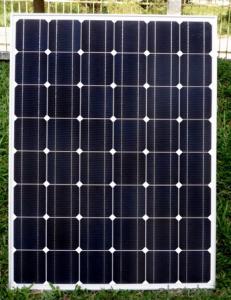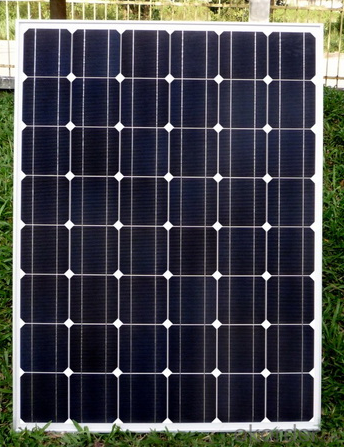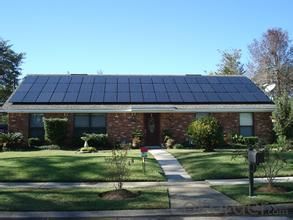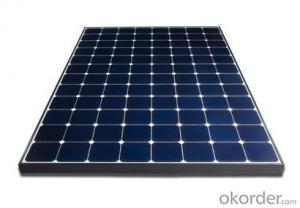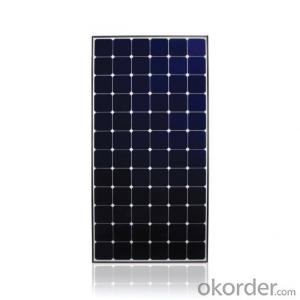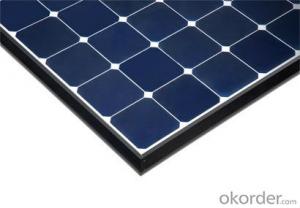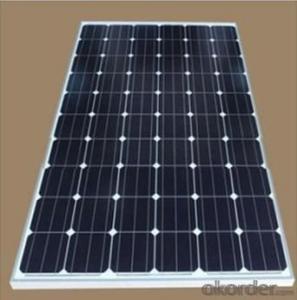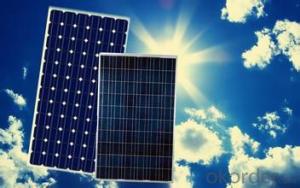15kw CNBM Monocrystalline Silicon Solar Panels 48v for Home Use
- Loading Port:
- Qingdao
- Payment Terms:
- TT OR LC
- Min Order Qty:
- 100 watt
- Supply Capability:
- 10000 watt/month
OKorder Service Pledge
OKorder Financial Service
You Might Also Like
Specification
15KW CNBM Monocrystalline Silicon Panel for Home Using
Production description
Solar energy is radiant light and heat from the Sun harnessed using a range of ever-evolving technologies such assolar heating, photovoltaics, solar thermal energy, solar architecture and artificial photosynthesis.
It is an important source of renewable energy and its technologies are broadly characterized as either passive solar oractive solar depending on the way they capture and distribute solar energy or convert it into solar power. Active solar techniques include the use of photovoltaic systems,
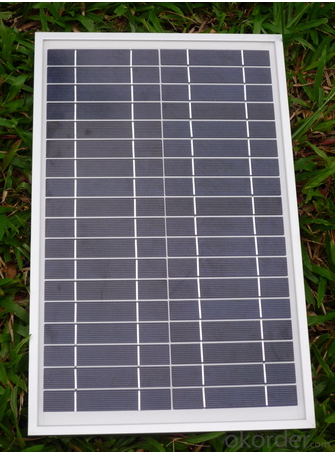
Feature
1.High conversion efficiencies resulting in superior power output performance.
2.Outstanding power output even in low light or high temperature conditions
3.Optimized design for ease of soldering and lamination
Physical characteristic
1. Rigorous quality control meets the highest international standards.
2. High-transmissivity low-iron tempered glass, strong aluminium frame.
3. Using UV-resistant silicon.
4. IS09001/14001/CE/TUV/UL
Packaging
26pcs in one carton 6pallets in 20foot container 14pallets in 40 foot container.
- Q: Why would someone use a solar panel? Does it have to do with the economy right now, global warming, or what?
- The sun provides power where ever the sun shines. That means you can have power without paying for power cables running for miles across rivers and valleys or just out in the middle of nowhere. Or in the middle of somewhere, you can get more or less off the grid (of electrical delivery) and save money and not be a slave to big business. And since the carbon footprint of making power with solar cells is entirely in the making of them and the batteries, it is a cleaner form of electricity. With the batteries needed to have power at night, it can mean that power doesn't fail when the wires go down in the grid.
- Q: I am building a solar panel I have wired in series 36 .5 volt solar cells to produce 8 volts I have another panel that has 34 .5 volt solar cells to produce 7 volts. Any issues with wiring these 2 arrays in Parallel? I.E. would the smaller array take usable power away from the larger array?
- Hmmm (8v -7v)/ 0 ohms .... shakes head....
- Q: Are there any health risks associated with solar panels?
- Overall, solar panels do not pose significant health risks. They are a safe and environmentally friendly source of energy. However, some minor risks can include potential electrical hazards during installation or maintenance, such as electric shock or fire. Additionally, the production and disposal of solar panels may involve certain toxic materials, although efforts are made to minimize their impact. Nonetheless, these risks are generally well-managed and can be mitigated through proper installation, maintenance, and adherence to safety guidelines.
- Q: Can solar panels be used in areas with high humidity?
- Yes, solar panels can be used in areas with high humidity. However, high humidity levels can affect the overall efficiency of solar panels due to a decrease in their performance. The moisture in the air can cause a film of dirt or dust to accumulate on the panels, reducing their ability to absorb sunlight effectively. Regular cleaning and maintenance can help mitigate these effects and ensure optimal performance.
- Q: Can solar panels be used for air conditioning?
- Yes, solar panels can be used for air conditioning. Solar panels generate electricity from sunlight, which can be used to power air conditioning units. By using solar energy, homeowners and businesses can reduce their reliance on traditional electricity sources and decrease their carbon footprint. However, the efficiency and effectiveness of using solar panels for air conditioning may vary depending on factors such as the size of the solar system, location, and energy requirements of the air conditioning unit.
- Q: How much would solar panels cost for: A Cell phoneA average houseA car
- They would cost quite a bit but the user would likely be eligible for some energy credits from the power company and their cell phone carrier which would bring down the costs
- Q: Can solar panels be used to power a military vehicle?
- Yes, solar panels can be used to power a military vehicle. Advances in technology have allowed for the development of lightweight and flexible solar panels that can be integrated into the structure of military vehicles. These solar panels can capture sunlight and convert it into electrical energy to power various systems and reduce reliance on traditional fuel sources. Implementing solar panels can enhance the sustainability and operational efficiency of military vehicles in certain scenarios.
- Q: If I wanted to add solar panels to my home to produce on average, 8 kWh of electricity daily, how much do you estimate it would cost using state of the art technology?I live in Virginia (Washington DC Metro Area), and I have Dominion Power. I pay the following electric rates:Jun-Sep $0.0904/kWhOct-May $0.0776/kWhAnnual Ave: $0.0824/kWhDistribution charges add on approximately another $0.0228/kWh.How long would the ROI for an 8 kWh/day solar system be?
- Figure 8 hours of sun per day, so 8 kW-hr is a rate of kW, which is a medium sized panel, probably not enough to operate your house totally, unless you have a very small unit. Averaged over 24 hours, that is power at a rate of only 300 watts, enough for a TV. Average US home use is .2 kW, which over 24 hours is 29 kW-hr, plus you need extra for cloudy days, peak demands, and to charge batteries. You have to decide off-grid or on-grid, and if you want to (and are allowed to) sell excess power to the power company. Off gird, the cost of batteries and charge controller are a large part of the cost. On-grid, you have to purchase equipment approved by the power company to match your power with the grid. Panels will cost about $3 per watt, so for 000 watts that is $3000. Double that for installation, then add in cost of charge controller, inverter, batteries, etc. The last items depend on your alternatives, see paragraph above. .
- Q: cheapest price for a 20 watt solar panel sold on line
- Expand your knowledge and learn from a renowned solar company about the Best and cheap Solar Panels. Visit our site and contact us today!
- Q: i am doing this group project fro school. I would like to know if anybody knows anything about how to read a Spec. Sheet on Solar panels and where I could go to start researching them. Anything would be great!
- Rate ,power , voltage and effencicney are four important iterms to choose one battery.
Send your message to us
15kw CNBM Monocrystalline Silicon Solar Panels 48v for Home Use
- Loading Port:
- Qingdao
- Payment Terms:
- TT OR LC
- Min Order Qty:
- 100 watt
- Supply Capability:
- 10000 watt/month
OKorder Service Pledge
OKorder Financial Service
Similar products
Hot products
Hot Searches
Related keywords
